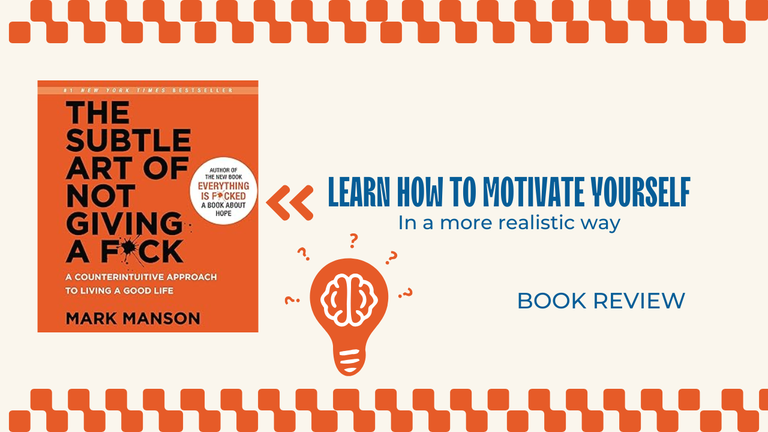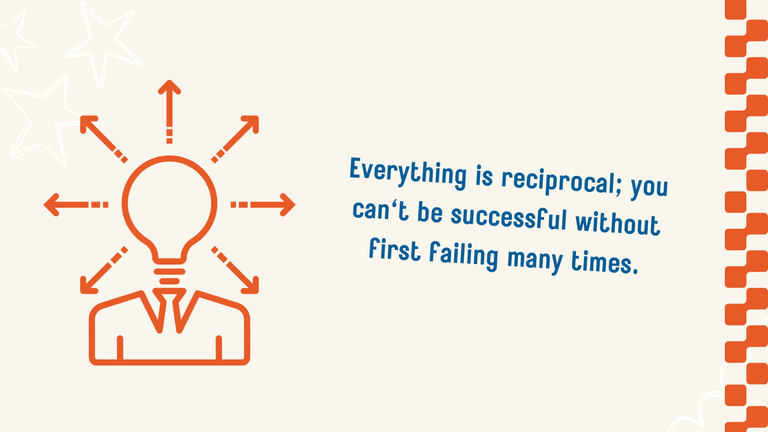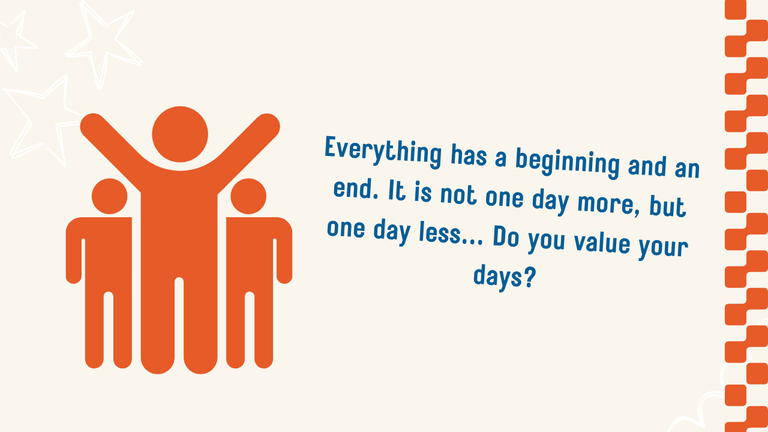This book will teach you to motivate yourself with your feet on the ground [ENG-ESP]
One of the biggest mistakes that exist, in my opinion, derives from the bad habit of idealizing things. We think that the meaning of life only contemplates a happiness that, without a doubt, is always fleeting. I myself had a mistaken idea about how I perceived reality; I quickly became frustrated by clinging to perfection and the success stories that were sold to me through social networks. If I am honest, I never imagined that a simple book could help me to awaken my conscience and understand that there is more than that superficial “don't give up” or “you are special” or “no one compares to you”.
This book I am talking about is called: “The Subtle Art of Not Giving a F*ck”... It's a rather curious name, isn't it? And more than that: it is the perfect formula to understand that life, besides contemplating happiness and success, is linked to the hard lunge of suffering, pain and failures.
Uno de los errores más grandes que existen, a mi parecer, deriva de la mala costumbre de idealizar las cosas. Pensamos que el sentido de la vida solo contempla una felicidad que, sin duda alguna, siempre es pasajera. Yo mismo tenía una idea errada sobre cómo percibía la realidad; me frustraba rápido al aferrarme a la perfección y a los casos de éxito que me vendían por las redes sociales. Si soy sincero, jamás imaginé que un simple libro me ayudara a despertar mi conciencia y, entender que hay más que ese superficialísimo que te impone el "no te rindas" o "eres especial" o "nadie se compara a ti".
Este libro del que les hablo se llama: "El sutil arte de que (casi todo) te importe un caraj*"... Es un nombre algo curioso, ¿no es así? Y más que eso: es la fórmula perfecta para entender que la vida, además de contemplar la felicidad y el éxito, está ligada a la dura estocada del sufrimiento, el dolor y los fracasos.

Mark Manson outlines in his book an idealism from which many flee: we all have a beginning, but also an end. How do you want to reach the end of your journey? Sometimes, we approach life as if it were a chimera of laughter and wonderful dreams, something that characterizes us as human beings who, no doubt, wish for everything good in the universe to reach us. But this is never the case; at any moment and in any circumstance, we will come up against an obstacle, an emptiness that forces us to reflect on the steps we have taken, and why they are still insufficient. Because yes, it is never enough, even if it seems we have it all.
So, we walk around, reflecting our lives in the lives that others have, venerating a happiness of others that, by thought and instinct, we also desire. At every instant, thousands of podcasts, videos, books, etc. emerge in which everything is as easy as inflating an air balloon. We are told that we should never give up, without exploring the reason why this thought of defeat arises. We are forced to have an optimistic vision, when in most cases this leads us to lock ourselves into something that only consumes and destroys us inside. We are isolated from basic feelings, limiting ourselves to only one: “the pursuit of happiness”, and in this process, we begin to put aside our own humanity.
Mark Manson esboza en su libro un idealismo del que muchos huyen: todos tenemos un inicio, pero también un final. ¿Cómo quieres llegar al final de tu recorrido? En ocasiones, nos planteamos la vida como si fuera una quimera de risas y sueños maravillosos, algo que nos caracteriza como seres humanos que, sin duda, deseamos que todo lo bueno del universo nos alcance. Pero nunca es así; en cualquier momento y circunstancia, nos toparemos con un obstáculo, un vacío que nos obliga a reflexionar sobre los pasos que hemos dado, y por qué siguen siendo insuficientes. Porque sí, nunca es suficiente, aunque parezca que lo tengamos todo.
Entonces, andamos por ahí, reflejando nuestras vidas en las vidas que tienen otros, venerando una felicidad ajena que, por pensamiento e instinto, también deseamos. A cada instante, surgen miles de pódcast, videos, libros, etc. en los que todo es tan fácil como inflar un globo de aire. Se nos repite que nunca debemos rendirnos, sin explorar sobre la razón de por qué surge ese pensamiento de derrota. Se nos obliga a tener una visión optimista, cuando en la mayoría de los casos esto nos lleva a encerrarnos en algo que solo nos consume y destruye por dentro. Se nos aísla de los sentimientos básicos, limitándonos a solo uno: "buscar la felicidad", y en este proceso, comenzamos a dejar de lado muestra propia humanidad.

It is not that seeking happiness is bad, not if you understand that principle of attraction that Mark Manson elucidates in his text: if you seek the good you will encounter the bad. Almost like the reciprocity of the universe, it is not understood that whatever we desire will lead to an adverse momentum. If you want to be happy, you must first understand what it means to be sad. If you want to have a lot of money, you must first encounter losing it all. There is no straight and clean line to the end; you have to suffer and shed a lot of tears and sweat, and that's okay, because that's what makes us human. So, it is not enough just to be happy, you have to be disappointed, you have to cry, you have to fail, you have to lose everything... as long as you know what to face, it will be easier to know if it is worth sacrificing or not.
And there comes another great message in this book: not everything is worth it, one should not take lightly to suffer to achieve something that, in reality, will only lead us to waste our time. You should never fall in love with the goal, but with the process. If you know you don't like drawing, then why do you want to be a painter? Looking for something we feel comfortable with will lead us to be constant in the field we desire.
No es que buscar la felicidad sea malo, no si se entiende ese principio de atracción que Mark Manson diluye en su texto: si buscas lo bueno te toparás con lo malo. Casi como la reciprocidad del universo, no se entiende que cualquier cosa que deseemos nos llevará a un momentum adverso. Si quieres ser feliz, primero debes entender lo que significa estar triste. Si quieres tener mucho dinero, primero debes toparte con perderlo todo. No hay una línea recta y limpia hasta el final; hay que sufrir y derramar muchas lágrimas y sudor, y eso está bien, pues es lo que nos hace humanos. Entonces, no solo basta estar feliz, hay que decepcionarse, hay llorar, hay que fracasar, hay que perderlo todo... mientras sepamos qué enfrentar, será más fácil saber si vale la pena sacrificarse o no por ello.
Y allí viene otro gran mensaje en este libro: no todo vale la pena, no se debe tomar a la ligera sufrir por lograr algo que, en realidad, solo nos llevará a perder el tiempo. Nunca hay que enamorarse de la meta, sino del proceso. Si sabes qué dibujar no te gusta, ¿entonces por qué quieres ser pintor? Buscar algo con lo que nos sintamos cómodos, nos llevará a ser constantes en el ámbito que deseemos.

In nine parts, Mark Manson lets us explore the great banality of motivational superficiality; the author invites us to reflect on the real perspective with which we lead our lives, understanding that the road to happiness is never constant. Humility leads us to see that we are not a shining star, but that we are simple people; true peace comes when we understand that being common and ordinary is what, in reality, makes us different.
Have you already read this book? Tell me what you think in the comments.
En nueve partes, Mark Manson nos deja explorar la gran banalidad de la superficialidad motivacional; el autor nos invita a reflexionar sobre la perspectiva real con la que conducimos nuestras vidas, entendiendo que el camino a la felicidad nunca es constante. La humildad nos conduce a mirar que no somos una estrella brillante, sino que somos simples personas; la verdadera paz llega cuando entendemos que ser comunes y corrientes es lo que, en realidad, nos hace distintos.
¿Ya has leído este libro? Cuéntame tu opinión en los comentarios.
See you in the next book review!
Posted Using INLEO
The truth is that idealizing happiness can lead to constant frustration. It is liberating to understand that we don't have to be perfect or always happy. Life is a process, and learning to love that process, with its ups and downs, is fundamental. Definitely a worthwhile book. Thanks for sharing!